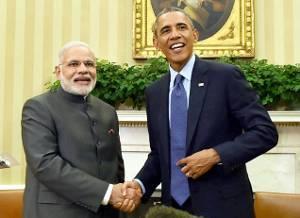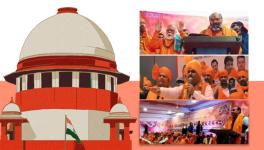3 Years of the Govt: Foreign Policy in Shambles

Over these three years of Modi raj, we have seen India abandon its position as an important, independent voice of the global south, and relegate itself to a subordinate ally of the US. Nearer home, Indian policy on Pakistan, China and Nepal has been a complete failure. Poorly thought out and ill-prepared initiatives, have been accompanied by noisy sabre-rattling and brinkmanship. And at home, the callous responses to incidents of racism against African students, have led to a backlash against India in Africa, and could, possibly, have long-term diplomatic repercussions.
The primary focus of Modi’s foreign policy is Modi: all policy has been almost entirely Modi-centric, complete with gala media events during his more than frequent foreign tours. The Ministry of External Affairs and India’s professional diplomats have been kept out of the loop; the consequence has been a complete lack of serious diplomatic engagement during such visits. Rhetoric and atmospherics – shadow over substance – has been the dominant theme. This has been compounded by a view of India’s foreign policy through a narrow, security lens; and in the eyes of the world, virtually hyphenating India with its much smaller neighbour Pakistan.
India-US Defence Agreements
India signed a 10-year Defence Framework Agreement with the US in 2015. It has now followed this up with three more agreements – the Logistics Support Agreement (LSA), the Communication and Information Security Memorandum of Agreement (CISMOA), and the Basic Exchange and Cooperation Agreement (BECA). The Logistics Support Agreement has been re-christened the Logistics Exchange Memorandum Agreement (LEMOA), but this is only a cosmetic exercise. All three, along with the Framework Agreement, commit India to providing its harbours, airfields and bases to the US armed forces, to “borrowing” Indian equipment, and to integrating the Indian armed forces through “inter-operability” of their arms and equipment. Not only will India act as a base for US military misadventures in the region; it will also buy US military hardware so that both forces use the same military equipment, and integrate themselves within a common military command and control structure. This is going well beyond a conventional military pact. This is, in fact, the biggest sell-out of India’s strategic interests -- an anti-national act without parallel in India's history.
The Malabar naval war games carried out last year by the US, Japan and India in the Japan Sea near Okinawa and off the Philippines, are clearly a part of the US attempt to meddle in the South China Sea controversy between China, Vietnam and the Philippines. India been toeing the US line on the South China Sea.
Many pronouncements by the Indian and the US side, have stressed the interoperability of the two navies. Commenting on the possession of Boeing P-8 Poseidon military aircrafts by both the Indian Navy and the US Navy, Vice Admiral Joseph P Aucoin said, "I would like those two aircraft working together and to hunt submarines.” For this interoperability, India has spent one billion dollars to procure four P8I aircraft from Boeing.
Along with these interoperability agreements, the Modi government is also allowing 100% FDI in defence. US companies can set up 100% owned subsidiaries, transfer no technology to India, and simply sell India US hardware, claiming it is from India. This is Modi's Make-in-India policy, distinct from the earlier Made-in-India policy that demanded transfer of technology to India. With India totally dependent on foreign military know-how and hardware, its armed forces will lose their ability to function independent of the US.
Strains with neighbours
Under Modi, India's relationship with its neighbours – Pakistan, China and Nepal – has sunk to a new low. It reflects the simplistic belief shared by Modi and the BJP's that foreign policy is a matter of bluff and bluster. But countries, even small ones, are not cowed by either military or economic threats. Bypassing the External Affairs Ministry has also meant that there has been no preparation for any serious engagement. Hurried, ad-hoc meetings with foreign leaders have been combined with grandstanding in the media. This has resulted in long-term damage to India’s relationship in the region.
In the case of Pakistan, Modi began well by inviting PM Nawaz Sharif and other SAARC leaders to his swearing-in ceremony. But soon after, the proposed talks between the two foreign secretaries were called off, because of the Pakistani Ambassador's meeting with Hurriyat leaders. Modi’s subsequent air dash to Lahore, and the ensuing pappi jhappi, was followed by the Pathankot terror attack, and the fiasco over the visits of the investigators. The Indian Army conducted a cross-border raid, hyped by Modi spokespersons as a “surgical strike”, as if the Indian Army had not made similar strikes in the past. A climate of hyper-nationalism was encouraged. Any call for peace between India and Pakistan was deemed to be treason.
Earlier, there was at least a start and stop process of talks: talks and break down of the talks. In the last year, it has been an eye-ball to eye-ball confrontation between two nuclear armed states; a confrontation that can spin out of control at any moment. Modi's claim that playing tough will force Pakistan to sue for peace has been proven for what it always was, simple hot air. Terrorist violence, cross border violence and the loss of lives of both civilians and armed personnel have only increased under Modi's stewardship.
India's relations with China have followed a similar trajectory. The initial warmth in Ahmedabad quickly evaporated in the stand-off in Ladakh. Relations deteriorated with India’s endorsement of the US position on South China Sea in a joint statement; India’s participation in a joint naval exercise with the US and Japan; China's opposition to India's NSG membership; China's blocking a UN declaration that Masood Azhar is a terrorist (which he undoubtedly is); India's retaliation inviting an Uighur activist designated as a terrorist by Interpol, and encouraging Dalai Lama's visit to Arunachal Pradesh. Together, these moves have brought India China relations to its lowest level in decades.
India has refused to join the Belt Road Initiative (or the One Belt One Road project) for which almost 100 countries have signed up. The endorsement by so many countries to building a common Eurasian-African road, rail and sea based trade network, is likely to leave India isolated. By hinging its opposition to the Belt Road Initiative primarily on the route of the China Pakistan Economic Corridor, India has cut itself off from the emerging trade connectivity with the rest of Eurasia. It is instructive that even the US, which backed India in its opposition to the Belt Road Initiative, sent a delegation to the recent international meet in Beijing. India's policy of tying itself to the US apron strings in Asia is rapidly unravelling, with India looking quite a bit like the odd man out.
India's handling of Nepal has been equally poor. In Nepal, India was perceived as encouraging the Madhesis in their long strike, in effect helping impose a blockade on all goods going from India to Nepal. Much goodwill was lost. This situation was not exactly improved by the likes of Adityanath arguing for a restoration of the discredited monarchy in Nepal because it was a Hindu one.
US Nuclear Deal
The only silver lining in India's foreign relations is that the India US Nuclear Deal, which the Left had opposed, has collapsed, though with no thanks to the Modi government. Westinghouse has filed for bankruptcy in the US, and only the very foolish would now go ahead with its offer to set up six Westinghouse units in Kovvada, Andhra. Hopefully, the guarantee the Modi government had given Westinghouse regarding underwriting suppliers' liability will not come back to haunt us, as the Vajpayee government’s sovereign guarantees to Enron did.
Israel
India has abandoned its policy support to national liberation struggles, and refuses to condemn Israel's continued occupation of Palestine, the only occupied country in the world today. It is now the major arms buyer of Israeli arms, buying more arms from it than even Israel's own armed forces. In the last 15 years, India has placed orders for more than $10 billion of Israeli arms and equipment, in spite of repeated proof of corruption in such deals. Even after serious slippages – e.g. Barak naval missiles' slippage of more than six years -- Israel is being rewarded with new orders worth $ 2.63 billion for the same Barak missiles, both the land and the naval versions. Both these have been signed in the last one month. Other big-ticket deals worth another $ 2 billion are in the pipeline.
All these deals are presumably to sweeten Modi's visit to Israel this July. India buying high value military items has also become a pattern of Modi's foreign visits. We saw this is the case of the $ 8.5 billion Rafale deal, where all defence procurement norms were jettisoned to get Modi's a royal welcome in France.
Racism
The Modi government's insensitivity to racism was highlighted by its callous and graceless response to the attacks on African students in Delhi and other places. Consequently, envoys of 44 African nations met in Delhi and called for an independent investigation by the UN Human Rights Council on the repeated racist violence unleashed on African students.
By distancing itself from independent policy, the Modi government has made India vulnerable to losing visibility and voice in all international fora. For the first time, an Indian Prime Minister did not show up for the Non-Aligned Summit. Today, India is seen as a subordinate ally of the US. Its hyper “nationalist” narrative is not anchored in anti-imperialism, the hallmark of the national movement, but in bombast and rhetoric. Its sole success in foreign affairs is limited to its “victory” in the television studios over its political opponents.
Disclaimer: The views expressed here are the author's personal views, and do not necessarily represent the views of Newsclick.
Get the latest reports & analysis with people's perspective on Protests, movements & deep analytical videos, discussions of the current affairs in your Telegram app. Subscribe to NewsClick's Telegram channel & get Real-Time updates on stories, as they get published on our website.
























